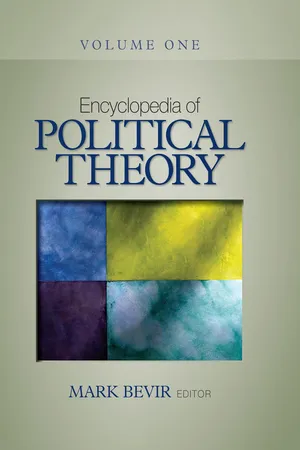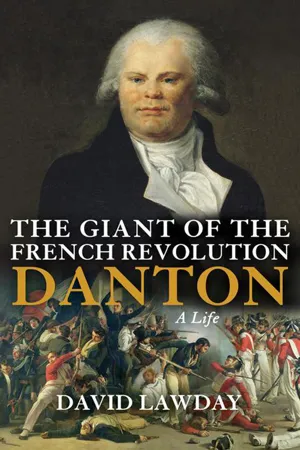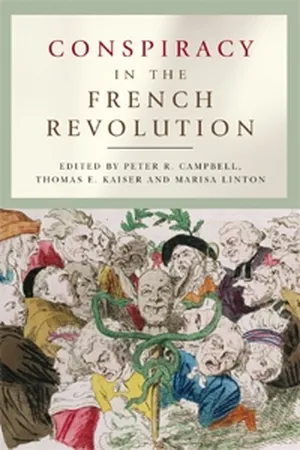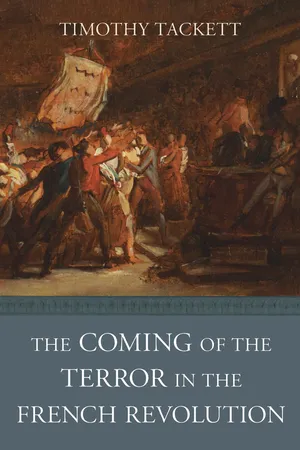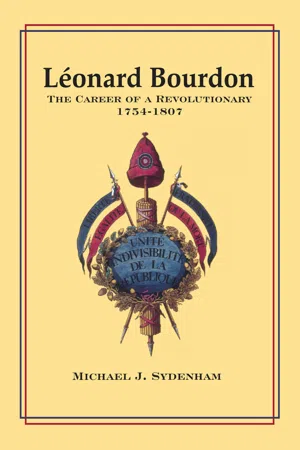History
Girondins
The Girondins were a political faction during the French Revolution who represented the moderate and provincial interests. They were named after the Gironde department in southwestern France and advocated for a constitutional monarchy and a decentralized government. The Girondins eventually fell out of favor and were overthrown by the more radical Jacobins.
Written by Perlego with AI-assistance
Related key terms
1 of 5
6 Key excerpts on "Girondins"
- Douglas Moggach, Gareth Stedman Jones(Authors)
- 2018(Publication Date)
- Cambridge University Press(Publisher)
II, p. 389. Lamartine, the Girondins, and 1848 17 had everything required of a citizen except for the one thing that really mattered: virtue. Lamartine notes the energy and conviction of the Montagnards but dwells on their weakness and limitations; and except for Madame Roland and Condorcet and (sometimes) Vergniaud, the Girondins are treated critically as lightweights and ‘intriguers’. Insofar as the book has a hero, it is not Vergniaud nor any of the Girondins but rather Robespierre, who is presented as engaged in his last months in a desperate struggle to contain the radical forces that he himself has done so much to unleash. Why then were the Girondins interesting to Lamartine? Why did he call his book the Histoire des Girondins? The short answer is that when Lamartine chose the title in August 1843, his original plan was to focus on the period running from the opening of the Legislative Assembly (1 October 1791) to the exclusion of the Girondins from the Convention (2 June 1793). 12 The more illuminating answer is that for Lamartine the Girondins were negative models. They were revolutionary rhetoricians for whom politics was a matter of public gesture and private intrigue carried on ‘in the interest of the lettered middle class to which they belonged’. They were ‘men imbued with the republican ideas of antiquity, when the liberty of citizens presupposed the slavery of the masses and when the republics were so many aristocracies’. No wonder then that the Girondins ‘had a poor understanding of the Christian genius of the democratic republics of the future’. 13 The Girondins were also weak and inconsistent. They pushed for a declaration of war in the mistaken belief that it would purge the body politic and consolidate their power. They played a leading role in the overthrow of the monarchy, but they were incapable of establishing a viable republic.- eBook - ePub
- Mark Bevir(Author)
- 2010(Publication Date)
- SAGE Publications, Inc(Publisher)
The Jacobins acted as a debating club and political pressure group rather than as a formal political party. The French revolutionaries were opposed to the idea of political parties, thinking that parties would be used to promote particular interests rather than the good of all. In the early years of the revolution, the Jacobin club was dominated by relative moderates such as Antoine Barnave, Adrien Duport, and Alexandre Lameth who were committed to a constitutional monarchy and a limited franchise. Following the attempted flight of Louis XVI in June 1791 and the gradual unraveling of the constitutional monarchy that followed, the moderates left the club. In late 1791, the club came under the domination of Jacques Pierre Brissot and the group later known as the Girondins, a group that spearheaded the drive to war over Robespierre’s objections.In the summer of 1792, when the monarchy was overthrown and the first French republic founded, the Jacobins moved decisively to the left. The Girondins abandoned the club in the autumn of 1792. It was now under the domination of radical revolutionaries, prominent among them Robespierre, Georges Danton, Louis de Saint-Just, Jean-Paul Marat, and other members of the “mountain” (Jacobin deputies in the National Convention). In September 1792, the Jacobins changed their name to the Society of Jacobins, Friends of Liberty and Equality. In June 1793, the sans-culottes (the poorer working-class members, so named because they wore full-length trousers instead of the more fashionable knee-length culottes) ousted the discredited Girondins from the convention, and the Jacobins came into government.The Jacobins were hard-liners, prepared to enforce the aims of the revolutionary government and make a concerted effort to gain victory both in the war with foreign powers and with the many counterrevolutionaries within France. To do this, these hitherto idealistic and humanitarian men adopted the tactics of terror. They formed the first government to enlist terror in the cause of a political ideal. The terms terrorist and terrorism were invented retrospectively in late 1794 to describe the Jacobins and their methods. The Jacobins proved to be cautious about implementing the economic measures desired by the sans-culottes and were made uneasy by the violence of the sans-culottes, even though the threat of that violence had been enlisted to put the Jacobins into power. The Jacobins curbed the political autonomy of the sans-culotte movement, and the sans-culottes - eBook - ePub
The Giant of the French Revolution
Danton, A Life
- David Lawday(Author)
- 2018(Publication Date)
- Grove Press(Publisher)
Exit ModeratesIt amazed Danton that the Girondin leadership – men (and, of course, a woman) of high ideas – could be so obtuse. There were not two but three wars he had to fight: after the monarchs of Europe and counter-revolution at home, he had a war on his hands against avowed republicans whose philosophy he fundamentally shared. He was with them on property, on education, on religion, on all manner of items that were going into the republic’s slow-born constitution. How hard he had tried to bring them round. Perhaps Madame Roland, her husband and her adoring Buzot were beyond reach, but surely other leading Girondins could be made to see that their refusal to lock arms with fellow patriots in this perilous hour spelled doom for the new France they had created – and that their own doom would in all likelihood precede it.Danton had done his damnedest to work for a truce. On the eve of his final trip to Belgium in early March 1793, heartbroken by Gabrielle’s death not a month before, he and Camille had set up a secret meeting with the Girondins away from the angry ballyhoo of the Riding School. It took place a few miles outside the city walls at Sceaux, in a village house owned by Lucile’s mother, Madame Duplessis. The Girondins who came were the movement’s more approachable leaders, men whom Danton had dealt with, befriended even, before relations soured. Brissot and Vergniaud were there, and so was the courtly constitutionalist Condorcet, and Pétion, the Mayor of Paris. These were men of the progressive bourgeoisie with a dash of nobility in their ranks who did not necessarily share the Roland couple’s snobbish abhorrence for Danton and the radical Jacobins. Still, the attempt at reconciliation failed. Danton was saddened: there was common ground, to be sure, but his adversaries refused to bury the hatchet with the Mountain, insisting that a truce would amount to giving immunity to the ‘savages’ who abetted the prison massacres, which they would not permit. - eBook - PDF
- Peter R. Campbell, Thomas Kaiser, Marisa Linton(Authors)
- 2024(Publication Date)
- Manchester University Press(Publisher)
Behind Robespierre’s dogged opposition to the war policy was an 130 Marisa Linton underlying concern over the conduct of power under the so-called ‘Girondin ministry’ and the fear that Brissot, Roland and others either were in league with the court or were its dupes. 9 The group of revo- lutionaries who gathered around Brissot was only loosely connected. Indeed it is debatable at what stage, if at all, the Girondins became a distinctive group. Part of the difficulty lies in the fact that their opponents at the Jacobin Club began to refer to a faction of ‘Brissotins’ (or later ‘Girondins’) the more easily to attack them as a group by making them appear a united faction. Sydenham went so far as argue that it was the Jacobins who constructed the ‘Girondins’ as a focus for opposition, though the meticulous work by Alison Patrick demonstrated the existence of numerous identifiable ‘Girondins.’ 10 The very accusation that the Girondins constituted a faction was itself used as evidence against them, factions being seen as inimical to the revolutionary project. 11 If the Girondins had a coherent identity it was as the group around Brissot himself. Insofar as the Girondins had a political leader at all, it was he, and it was against Brissot that the strongest criticism was made. The Girondin leaders such as Brissot and Vergniaud were very far from being the politically idealistic, high-minded revolutionaries that some historians (in a tradition beginning with the romantic poet Lamartine) liked to portray them. The idealized image was used to contrast them favorably with the more hard-line terrorist Jacobins. But the Girondins themselves bear much responsibility for the escalation of violence in 1792 and early 1793 through their deliberate manipulation of the Revolution for their own ends, a policy that laid the foundations of the Terror. Most crucial of all was the role played by Brissot and others in leading the clamor for war in the winter of 1791/92. - Timothy Tackett(Author)
- 2015(Publication Date)
- Belknap Press(Publisher)
Maximilien Robespierre, leader of the Montagnard faction of the Jacobins. Bibliothèque nationale de France.Jacques-Pierre Brissot, leader of the “Brissotins” or Girondin faction. Bibliothèque nationale de France.It is not impossible, of course, that political posturing and demagoguery played a role in the accusations between factions. Yet if we can believe the observations of Dumont, by March of 1792 the Girondins were totally swept up in the culture of suspicion. When the Genevan pastor met with the group that spring, “they talked only of the conspiracies of the emigrants and the ‘Austrian committee,’ and of the treachery of the court.”67 The terrible factionalism reminded Dominique Garat of the stories he knew so well in his studies of ancient history: “Parties that hoped to destroy one another, accused each other of trying to destroy the state.” “In the beginning such allegations were perhaps only suspicions born of hatred or harsh insults arising from all-consuming anger; but in the end they became a profound conviction.” The deputies’ personal correspondence conveys the intensity of the fears of treachery and conspiracy, conspiracy both external and internal to France, and inside the Assembly itself.68 Their vision of events was rapidly penetrated by the same Manichaean imaginary touching so much of French society, in which factional rivals were not simply misguided or dull minded, but treacherous and morally tainted.Whatever the origins of factionalism in the Revolutionary assemblies, once deputies came emotionally to identify with a given “party,” their allegiance rapidly crystallized and took on a life of its own. Factional confrontations assumed the character of a struggle for power and for survival. For Cambon, writing in October 1791, the principal objective of both the Feuillant and the Jacobin clubs was to destroy their opponent. Each side seemed to define itself as much by what it opposed in the factional “other” as by what it actually supported.69 Elements of both revenge and fear of revenge came into play. The anger and hatred long focused on aristocrats and the refractory clergy were now directed at the opposing faction, as competing groups came to vilify and demonize their antagonists.70 Representatives on the left used emotionally charged epithets from the first National Assembly, stigmatizing their Feuillant rivals as “blacks” or “ministerials.” The Jacobins Malassis and Cavellier would complain of “our Maury’s, our Cazalès’, our Malouet’s”—referring to three of the most eloquent defenders of the Right in the previous Assembly. “For,” they added, “we too have such men.”71- eBook - PDF
Léonard Bourdon
The Career of a Revolutionary, 1754-1807
- Michael J. Sydenham(Author)
- 2006(Publication Date)
- Wilfrid Laurier University Press(Publisher)
On the other hand, in April the Montagnards similarly tried to deprive the principal Girondins of their seats. Probably in the hope that these men would retire voluntarily, they encouraged, if not actu-ally stimulated, 2 the demand by most of the sections of Paris and many Jacobin Clubs for the expulsion of all unfaithful deputies—variously identified as the appellants, as that sain parti of the Convention that Dumouriez had hoped to rescue, or simply as the bad blood in the assembly. This campaign, however, failed to intimidate the Girondins, who responded to threats by becoming still more intransigent. More-over, the more responsible Montagnards, particularly Robespierre, became alarmed lest provincial opinion be irrevocably alienated by some premature act of violence in the capital, if indeed that act did not end in the whole assembly being forcibly dispersed. The Monta-gnards consequently seem to have fallen back on the saner, if slower, course of associating themselves still more closely with the people by supporting the universal popular demand for some measure of price control. This position became apparent on April 20, when the Mon-tagnards responded to Girondin denunciations of the Commune by vociferously identifying themselves with that body's sworn intent to remain in insurrection 3 until food supplies had been assured. There may then even have been some tacit understanding by which the 142 / Leonard Bourdon: The Career of a Revolutionary Montagnards' backing of price control was matched by municipal acceptance of the view that a purge of the Convention should be restricted to the elimination of the most prominent Girondins. 4 Although Bourdon was still en mission in eastern France from April 25 to May 2, when the Convention debated the question of food supplies, he is sometimes supposed to have been the author of one of the proposals under consideration.
Index pages curate the most relevant extracts from our library of academic textbooks. They’ve been created using an in-house natural language model (NLM), each adding context and meaning to key research topics.

